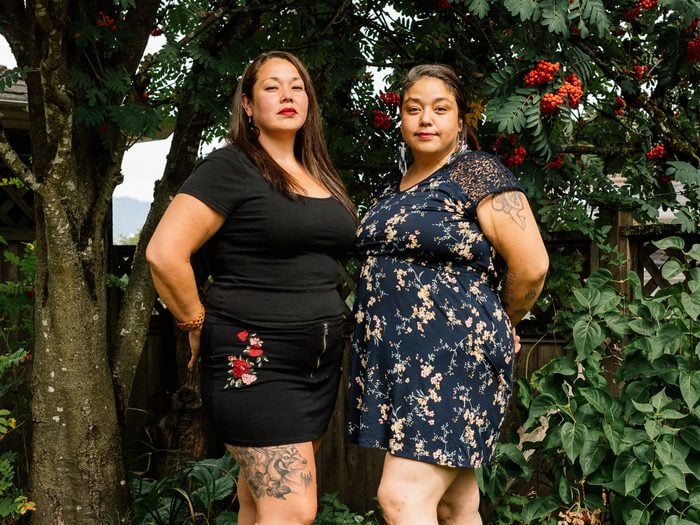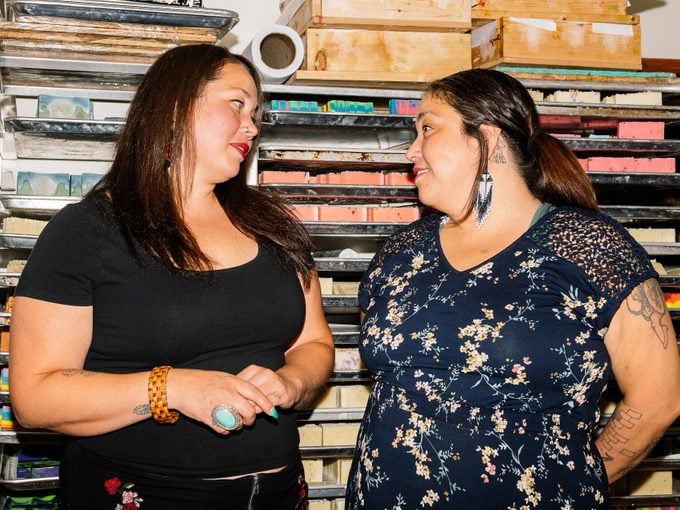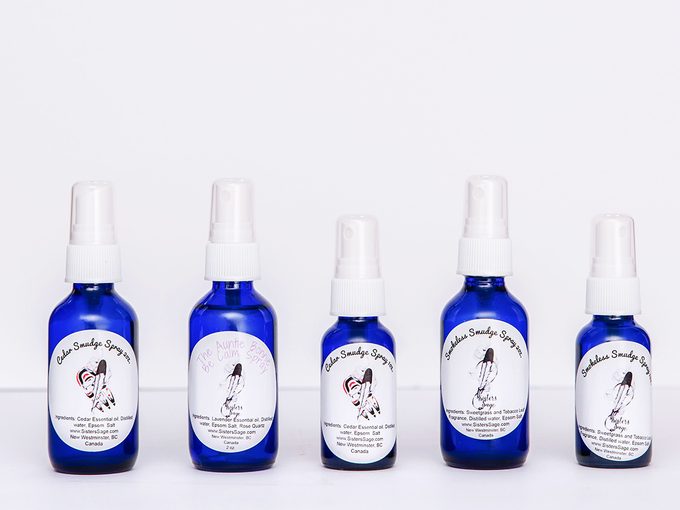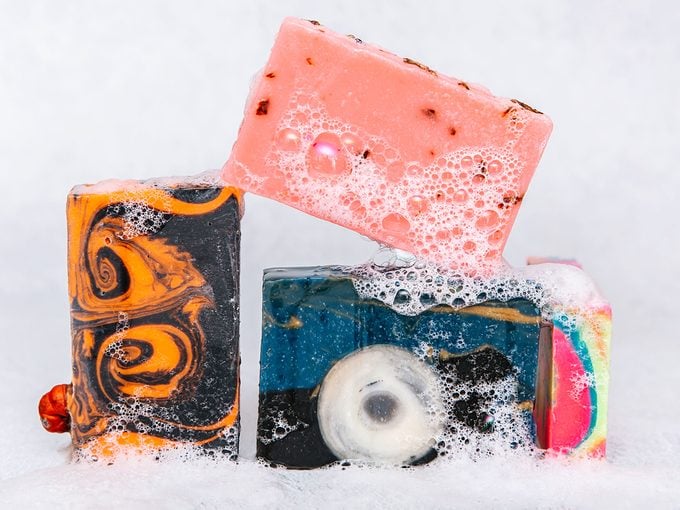Meet Sisters Sage, an Indigenous Wellness Brand Reclaiming Smudging

"It’s gross and hurtful when I see white-owned companies appropriating Indigenous culture, like selling smudge sticks," says Sisters Sage founder Lynn-Marie Angus.
When I was growing up, my mom and dad would do a daily smudging with braided sweetgrass or sage. Smudging is a spiritual ceremony that can be performed daily, or whenever the person feels drawn or called to it. Burning these medicines cleanses our environment, our body and our spirits. We say our prayers and send them on the smoke up to creator. Performing a smudge can happen at any time. Say you have a nightmare, you smudge. Somebody’s getting married? Smudge.
Indigenous folks across Turtle Island are not a homogenized group of people. We’re different nations and different people with different languages, cultures, foods and legends. I was born in Vancouver in 1984 and my sister Melissa-Rae was born a year later. Our mom is Cree–Métis and she’s from the Prairies, near Winnipeg, Manitoba. Our dad is Gitxaala and Nisga’a from the northwest of British Columbia. It was important for our parents to keep us connected to both sides of our family so together we lived in Winnipeg, Prince Rupert, B.C. and Vancouver.
No matter where we lived, traditional medicines were part of our life and our community. My first memories of my Indigeneity were going to powwows in the Prairies with colourful, bright and flashy regalia. When we moved to the west coast, it was more of a potlatch culture and people wore red and black button blankets. The medicines we used were different too. Sage and sweetgrass were very much Prairie medicines—their smells bring me back to my youth and childhood. On the west coast, cedar is life. It’s used for grounding and protection.
Harvesting sage for myself and others
When I was young, I learned that medicines are traded, gifted or harvested for yourself. They’re never sold. Growing up, my mom or my sister would give them to me. I didn’t harvest them myself until 2010, when I was in my 30s. I was living in Vancouver and a friend, who had done a lot of harvesting and knew the land well, invited me to harvest sage. When we went to her secret spot, a few hours from the city, I could smell the sage in the air. I put into practice the learnings I’d been taught over the years, gave an offering of tobacco, prayed and gave thanks to the plant that was nourishing us before harvesting.
At the time, I was a labourer in the construction industry, working predominantly with white men. It was a sexist and racist environment. Meanwhile, my sister Melissa was pregnant and facing homelessness because no one wanted to rent to an Indigenous, tattooed, pregnant woman. We were both in crisis.
“We can’t do this anymore,” I told my sister one day after work in June 2018. We figured we had to be our own bosses. And it had to be Indigenous. We thought, what do we have to offer? How can we make money doing this? Melissa loved making bath bombs and medicines had always been a part of our lives. So, we decided to start a self-care product line called Sisters Sage, inspired by our culture and traditions.
(Related: This Soap Brand Is Sharing the Healing Power of Inuit Tradition)
Building an Indigenous wellness business

Our first market was in December 2018. At the time, we had two bath bombs and two soaps. We made about $500. I was like: “Holy shit. This is real. We could do this.” After that, we sold at craft fairs, pow wows, farmers markets, Indigenous conferences and person-to-person.
I was still working my day job while building up Sisters Sage. On June 21, 2019, Indigenous People’s Day, a male coworker trapped me in the construction elevator and wouldn’t let me out. I reported the incident to the Workers’ Compensation Board and took a leave from work. I was eventually diagnosed with PTSD and major depressive disorder.
Sisters Sage was a huge part of my recovery. Through the business, Melissa and I became part of a community of Indigenous entrepreneurs in B.C. We were creating a community for ourselves. It was uplifting. It was loving and caring. It was decolonizing. It was a total 180 from my experience in construction.
A few days after I was harassed at work, I went to a conference run by the Indigenomics Institute. There, I met with people from Shopify and they offered me free web hosting and hooked me up with people to help create my website. By February 2020, I was declared recovered from my PTSD and major depressive disorder and was offered my job back. I said: “No thanks.” I decided to pursue Sisters Sage full-time.
(Related: Black-Female-Owned Wellness Businesses to Support Now and Always)
Celebrating our history and reclaiming our medicines
Then the pandemic hit. Markets and events were cancelled. I transitioned to promoting our business online and through social media. The business, which is run out of my home in east Vancouver, has been growing steadily and I now have two people working with me. Melissa also helps out with production two to four times a week, in between taking care of her two kids.

Right now, we sell soaps, salves, bath bombs and smokeless smudges. We’ve also stayed true to the tradition of not purchasing or selling medicine. We use some of them as ingredients in our products, but we don’t sell sweetgrass and sage for smudging. Instead, we developed a smokeless smudge. I came up with the idea when I was living in a basement apartment and couldn’t burn anything because of the tenants upstairs. My alternative was a spray of cedar or tobacco with sweetgrass essential oil and Epsom salts in water. Smokeless smudge is now our number-one seller, often given to Elders for spaces where they can’t burn.
We use a lot of traditional medicines in our products. Our devil’s club is wild-harvested in B.C. and we harvest our own sage in Lillooet, B.C. We purchase our sxusem soap berries from a local Elder who sells them at pow wows in the Vancouver area. Our soaps pay homage to our families. The Pow Wow Soap is for our mom’s side in the prairies. It’s a bright neon blue, yellow and pink, like powwow regalia. The West Coast Soap is from our dad’s side. It’s black and red, since those are traditional colours on the west coast. With every product we sell, we’re sneaking in some Indigenous education. Every product has a story behind it.
(Related: “For Me, Self-Care Is Self-Compassion”)

Support Indigenous-owned business (and stop buying smudge sticks)
It’s gross and hurtful when I see white-owned companies appropriating Indigenous culture, like selling smudge sticks. Indigenous folks, for hundreds of years, have been persecuted and legislated against practising our culture, never mind profiting off of it. But now, all of a sudden, you get to profit off of it. It’s just wrong. When the dominant culture steals and profits off of cultural properties of Indigenous folks, they continue the economic oppression that we have been facing for centuries. It is important to purchase authentic items from authentic sellers to support the Indigenous economy, our financial sovereignty and independence.
As we grow our products and our business, creating and harvesting medicines has allowed me and my sister to heal—and share healing with others. Working in an industry that’s predominately white is daunting. It’s intimidating. Most of the time I feel like I don’t know what I’m doing. But I’ve received such an amazing response from people across Canada who want to support small businesses, women-owned businesses and Indigenous businesses. I really feel like I’ve found my niche.
This story is part of Best Health’s Preservation series, which spotlights wellness businesses and practices rooted in culture, community and history. Read more from this series here:
This Soap Brand Is Sharing the Healing Power of Inuit Tradition
This Canadian Soap Brand is Rooted in Korean Bathhouse Culture
Sharing Chinese Herbal Soups and Teas, Steeped in Tradition
Get more great stories delivered straight to your inbox by signing up for the Best Health Must-Reads newsletter. Subscribe here.




